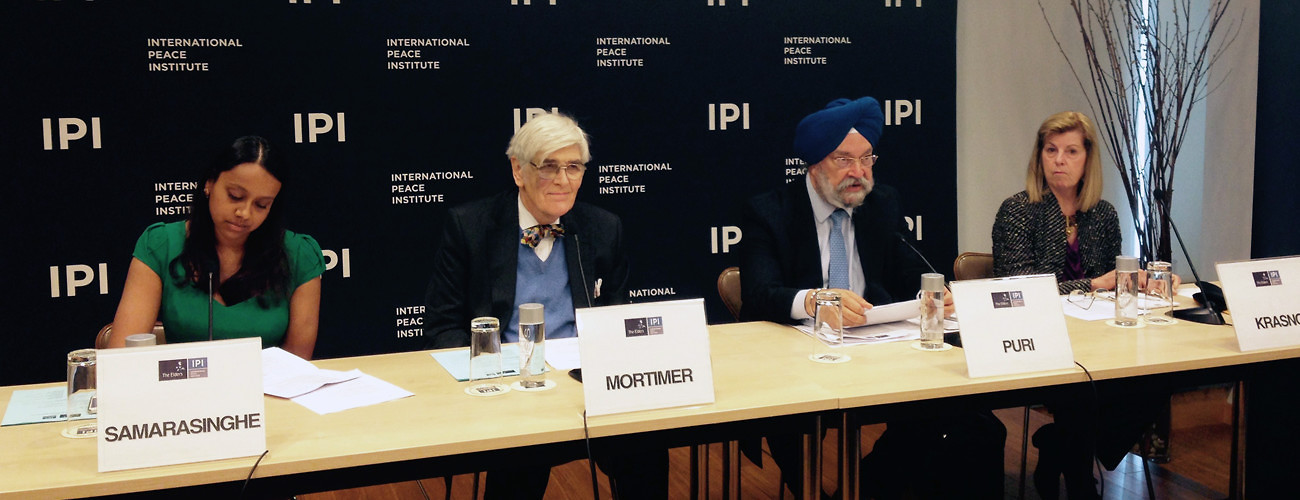A coalition of independent individuals and nongovernmental organizations backed by former UN officials is calling for an established process to select the UN secretary-general that would make the procedure open, transparent, and merit-based.
Speaking at IPI on April 24th on “UN Reform: Selecting the Next Secretary-General,” representatives from global organizations, including the 1 for 7 billion campaign and The Elders, criticized the current procedure—such as it is—as outdated, secretive, and lacking any measure of fairness and democracy. The panelists noted how the citizens of the UN’s 193 member states have come to realize the importance this post represents and are now calling for a more active role in its selection.
“People do care, they really get this issue,” said Natalie Samarasinghe, the executive director of the UN Association of the UK. Ms. Samarasinghe, who was representing the 1 for 7 billion campaign, added: “[People] know what a fair selection process looks like, and they are absolutely shocked when they hear about how the UN currently proceeds. No job description, no timetable, no public scrutiny of candidates.”
Panelists noted that the UN Charter grants the General Assembly the authority to appoint the secretary-general “upon the recommendation of the Security Council.” However, they said, over the years the process that has emerged is one in which the Council—and at times only a select number of its five permanent members—decides who that person will be and sends the name to be rubber-stamped by the General Assembly.
“Members of the General Assembly must re-claim the responsibility the charter gives them,” said Edward Mortimer, senior adviser to The Elders on UN reform and formerly chief speechwriter and director of communications to then secretary-general Kofi Annan. “The Elders have called on the Assembly to insist that the Security Council recommend more than one candidate per appointment after a timely, equitable, and transparent search for the best qualified candidate, irrespective of gender or regional origin.”
Recommendations for improving the selection procedure abound. At their core, the proposals call for: appointing a secretary-general for a single, non-renewable term of seven years; providing a shortlist of more than one candidate—including both men and women; identifying a clear timetable with deadlines, including the opportunity for both member states and civil society to hear from the candidates; and focusing on skills and experience rather than geographic origin.
And it is on this last matter that some of the panelists disagreed, pointing to a larger debate currently taking place at the General Assembly.
In response to Mr. Mortimer’s proposal to abandon the geographic rotation system—currently, custom has it that secretaries-general rotate according to their regional origin—IPI Vice President Hardeep Puri said it is important not to understate the role played by regional groupings at the UN.
“In a system which is based on a very thin veil of consensus and broad acceptability, there have to be some rules which govern geographic rotation,” said Mr. Puri, who is also the secretary-general of the newly launched Independent Commission on Multilateralism. “I believe that this regional group [arrangement] is far more important than it appears from the outside.”
This point drew agreement from some members of the audience, including the permanent representatives of Croatia and Slovakia to the UN. According to the current planning, the next secretary-general is expected to be from an Eastern European country.
Vladimir Drobnjak, Croatia’s permanent representative, said the secretary-general’s selection procedure is something that the General Assembly has been working on for some time now. There have been resolutions calling for more transparency, he said, as well as debates proposing a more effective hearing process. But on regional groups, he said, matters are a little different.
“We can debate how they are composed,” he said. “But the whole UN system is based on regional rotation. The Security Council is composed based on regional groups and rotating members, and chairmanship of the main committees is based entirely on regional groups. So,” he continued, “regional groups are not just an auxiliary measure in the system. They are the heart of the system.”
The panelists also discussed the issue of gender balance in the process, now an increasingly topical issue. Jean Krasno, lecturer at Yale University and the City College of New York as well as the chair of the Campaign to Elect a Woman Secretary-General, said that today, 70 years after the UN’s foundation, there can no longer be an excuse for not considering a woman for the post. The UN, she said, has always called for equal rights between men and women, and “it’s time we honor those words.”
“A woman could do everything that a man can do in the office,” she said. “However, a woman can bring the knowledge of being a woman, the sense of discrimination, of vulnerability, and identification with women’s experiences all over the world.” Men can do this, she added, “but not with the same depth of knowledge.”
The event took place on the eve of the April 27th General Assembly debate on the topic, and was moderated by Mr. Puri.
Watch event:








